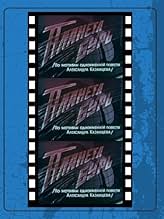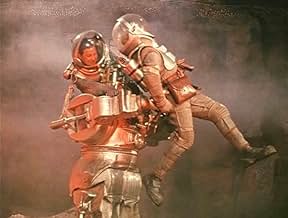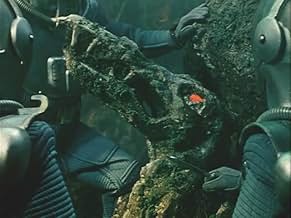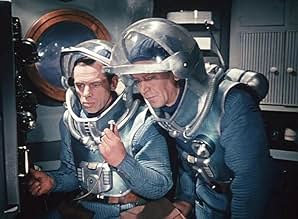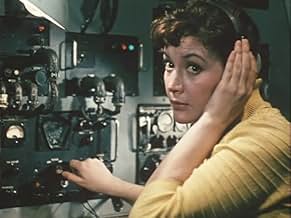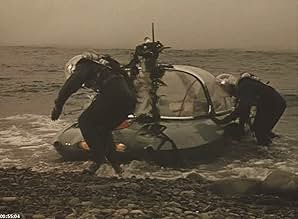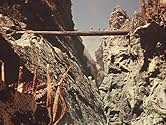CALIFICACIÓN DE IMDb
6.3/10
1.6 k
TU CALIFICACIÓN
Agrega una trama en tu idiomaCosmonauts land on the planet Venus. However, they find themselves in danger from the voracious monsters they find on it.Cosmonauts land on the planet Venus. However, they find themselves in danger from the voracious monsters they find on it.Cosmonauts land on the planet Venus. However, they find themselves in danger from the voracious monsters they find on it.
- Dirección
- Guionistas
- Elenco
- Dirección
- Guionistas
- Todo el elenco y el equipo
- Producción, taquilla y más en IMDbPro
Opiniones destacadas
It doesn't compare with modern day films at all, but then one shouldn't try to, should one? Gee they all (and probably "we too") took themselves so seriously those days!!
I'm confused by one previous commentator who said the film was in black and white. Maybe her TV was, but the film as I saw it last night certainly was in colour (well, 1960s colour, anyway).
One quote from the film certainly is worth commenting. That's where they are speculating that there may have been creatures who crashed their spaceship a long time ago and then turned feral. The character comments that they would have had "no culture". Well, that's the Eastern European way, isn't it? Culture is so important; but what they can't seem to perceive, so useless. As author Stephen Coonts said of the Russians: "They can all write poetry but not a single one of them can change a light bulb" (well something like that, anyway).
But putting that to one side, yes a most interesting and well-made film of its time. The singing absolutely blew me away. Not the quality of the singing, I mean the fact that they had singing at all in what otherwise seems to me such a "serious" movie!
I'm confused by one previous commentator who said the film was in black and white. Maybe her TV was, but the film as I saw it last night certainly was in colour (well, 1960s colour, anyway).
One quote from the film certainly is worth commenting. That's where they are speculating that there may have been creatures who crashed their spaceship a long time ago and then turned feral. The character comments that they would have had "no culture". Well, that's the Eastern European way, isn't it? Culture is so important; but what they can't seem to perceive, so useless. As author Stephen Coonts said of the Russians: "They can all write poetry but not a single one of them can change a light bulb" (well something like that, anyway).
But putting that to one side, yes a most interesting and well-made film of its time. The singing absolutely blew me away. Not the quality of the singing, I mean the fact that they had singing at all in what otherwise seems to me such a "serious" movie!
"Planeta Bur" is about cosmonauts who are lost on Venus, attempting to return to the spaceship, and their adventures along the way, which include encounters with prehistoric reptiles, a volcano, and other perils. Like Ptushko's "Sadko", this is a true gem of fantastic film. The use of natural and artificial sets is very effective in creating an atmospheric, alien world; the monsters (an intelligent robot, a carnivorous plant, pestiferous lizard men, a pterodactyl, and some other dinosaurs) are similarly well done. Unlike American films of this kind, there is no emphasis on macho violence or digressions into "steamy" romance scenes; instead the film concentrates on the lavish visuals in an unhurried and dignified pace. My only complaints are that the introduction is too long and slow-moving, and that the subplot involving Masha's agonizing over the fate of her comrades isn't very interesting; but the scenes on Venus, which comprise the bulk of the film, more than make up for these flaws. "Planeta Bur" was drastically edited by Peter Bogdonavitch and released in the States as "Voyage to the Planet of Prehistoric Women"; two versions exist, one with footage of Mamie Van Doren leading a tribe of telepathic Venusian women and worshipping the pterodactyl of the original film, the other without Ms. Van Doren or any of the prehistoric reptile footage.
10timayres
I saw this in my childhood and took years to track it down again since I saw it under one of its two confusing Roger Corman english-language re-edits [Voyage to the Prehistoric Planet with Basil Rathbone added, and Voyage to the Planet of Prehistoric Women, with mermaids scenes directed by Peter Bogdonavich.] Finally able to track down the original Russian version recently, I was able to fully appreciate the ambitious scope and production values. The forest is truly primeval in its detailed beauty, Robot John both heroic and sad in his dedication, and the ending poetic and lyrical. Non-U.S. science fiction films are doubly exotic, and this one is classic fare.
This is the first real Russian science fiction movie. I appreciated that it includes almost no ideological trash from the cold war, despite the time of its creation. The crew even includes one English speaking person, Mr. Kern. Mr. Kern is not as perfect as other members of the crew, but he is still a positive figure. What I liked was that this is real SF, and no mainstream movie with "magic" elements: there is space flight, there is an intelligent robot, there are fights with (quite funny) dinosaurs and pterodactyles, there are Venusians aliens and there is speculation about one solar race living on various planets but with common roots. It has all a SF fan can wish. (Except for time travelling and cyberpunk).
Pavel Klushantsev, who directed more Russian SF films than he's credited with here, found himself propelled from obscurity into sudden demand by the Soviet authorities when the production of his 1958 SF debut, 'Road to the Stars' coincided with the launch of Sputnik. Although he languished in almost total obscurity in the West, his films were enormously popular in the USSR, and, as a recent documentary noted, many of his cinematic innovations were 'borrowed' 10 years later by Kubrick in '2001'.
Planet of Storms is not a great movie, but compared with most of the SF which the USA was churning up to this time, it's positively stellar. It's weakest points are its sketchy characterisations, and rather poor pacing, but hard SF luminaries like Gernsback and John Campbell would probably have admired its attention to detail, and relative lack of sensationalism. The film actually begins with the disclaimer "Venus may well be entirely different to this" (or somesuch), and what follows is a serious attempt to depict a Venusian expedition - marred perhaps by the odd dinosaur, but surprisingly free of Soviet chest-thumping.
Planet of Storms won't blow your mind, but you'll find yourself being charmed by the ingenious photography, sets, creatures, etc. There's also a straight out hilarious scene where the Robot gets rained on, and goes off his head. While his two human companions are lying on the ground, dangerously ill from fever, he's babbling on about building a concrete highway to reach the other half of the expedition, who are are about 20 miles away. Contacting him via radio, they are somewhat alarmed to hear him tell them "According to quotes from the Smith corporation, the cost of building a highway to the Sirius is 37 million dollars". I don't know if this was a dig at capitalism, but it cracked me up anyway.
Now - some bloke wanted a translation of the lyrics to the song. These are courtesy of SBS TV Australia (translated by Elena Mikrailik and Brendan Doyle)
(first version)
Planet of Storms, we thank you for your lessons / We enjoyed our stay, but now we must be gone / Our ship awaits; our way is clear and straight / Our hearts are calling, "home, home home" / Yes, home, dear Comrades //
It's time to calculate the points of bearing / It's time to place our courage at the helm / She waits for us, the planet of our birth / Our dear home; our one and only Earth / Yes, Earth / Earth, dear Comrades //
(end of movie version)
Planet of Storms, we'll see you soon, don't worry / And in your harbour, our ships will gladly berth / For not in vain are we the sons of Earth / For not in vain are we the sons of Earth / Earth, dear Comrades
Planet of Storms is not a great movie, but compared with most of the SF which the USA was churning up to this time, it's positively stellar. It's weakest points are its sketchy characterisations, and rather poor pacing, but hard SF luminaries like Gernsback and John Campbell would probably have admired its attention to detail, and relative lack of sensationalism. The film actually begins with the disclaimer "Venus may well be entirely different to this" (or somesuch), and what follows is a serious attempt to depict a Venusian expedition - marred perhaps by the odd dinosaur, but surprisingly free of Soviet chest-thumping.
Planet of Storms won't blow your mind, but you'll find yourself being charmed by the ingenious photography, sets, creatures, etc. There's also a straight out hilarious scene where the Robot gets rained on, and goes off his head. While his two human companions are lying on the ground, dangerously ill from fever, he's babbling on about building a concrete highway to reach the other half of the expedition, who are are about 20 miles away. Contacting him via radio, they are somewhat alarmed to hear him tell them "According to quotes from the Smith corporation, the cost of building a highway to the Sirius is 37 million dollars". I don't know if this was a dig at capitalism, but it cracked me up anyway.
Now - some bloke wanted a translation of the lyrics to the song. These are courtesy of SBS TV Australia (translated by Elena Mikrailik and Brendan Doyle)
(first version)
Planet of Storms, we thank you for your lessons / We enjoyed our stay, but now we must be gone / Our ship awaits; our way is clear and straight / Our hearts are calling, "home, home home" / Yes, home, dear Comrades //
It's time to calculate the points of bearing / It's time to place our courage at the helm / She waits for us, the planet of our birth / Our dear home; our one and only Earth / Yes, Earth / Earth, dear Comrades //
(end of movie version)
Planet of Storms, we'll see you soon, don't worry / And in your harbour, our ships will gladly berth / For not in vain are we the sons of Earth / For not in vain are we the sons of Earth / Earth, dear Comrades
¿Sabías que…?
- TriviaThis movie is later edited and dubbed as "Voyage to the Prehistoric Planet", released in the US in 1965. This movie (and the Russian inserts) were in turn used to create "Voyage to the Planet of Prehistoric Women" (1968)
- Versiones alternativasFor the U.S. version, titled Voyage to a Prehistoric Planet (1965), all footage of Kyunna Ignatova has been removed and replaced with footage of American actress Faith Domergue playing the same part.
- ConexionesEdited into Voyage to the Prehistoric Planet (1965)
Selecciones populares
Inicia sesión para calificar y agrega a la lista de videos para obtener recomendaciones personalizadas
- How long is Planeta bur?Con tecnología de Alexa
Detalles
- Tiempo de ejecución1 hora 18 minutos
- Mezcla de sonido
- Relación de aspecto
- 1.37 : 1
Contribuir a esta página
Sugiere una edición o agrega el contenido que falta

Principales brechas de datos
By what name was El planeta de las tormentas (1962) officially released in Canada in English?
Responda
